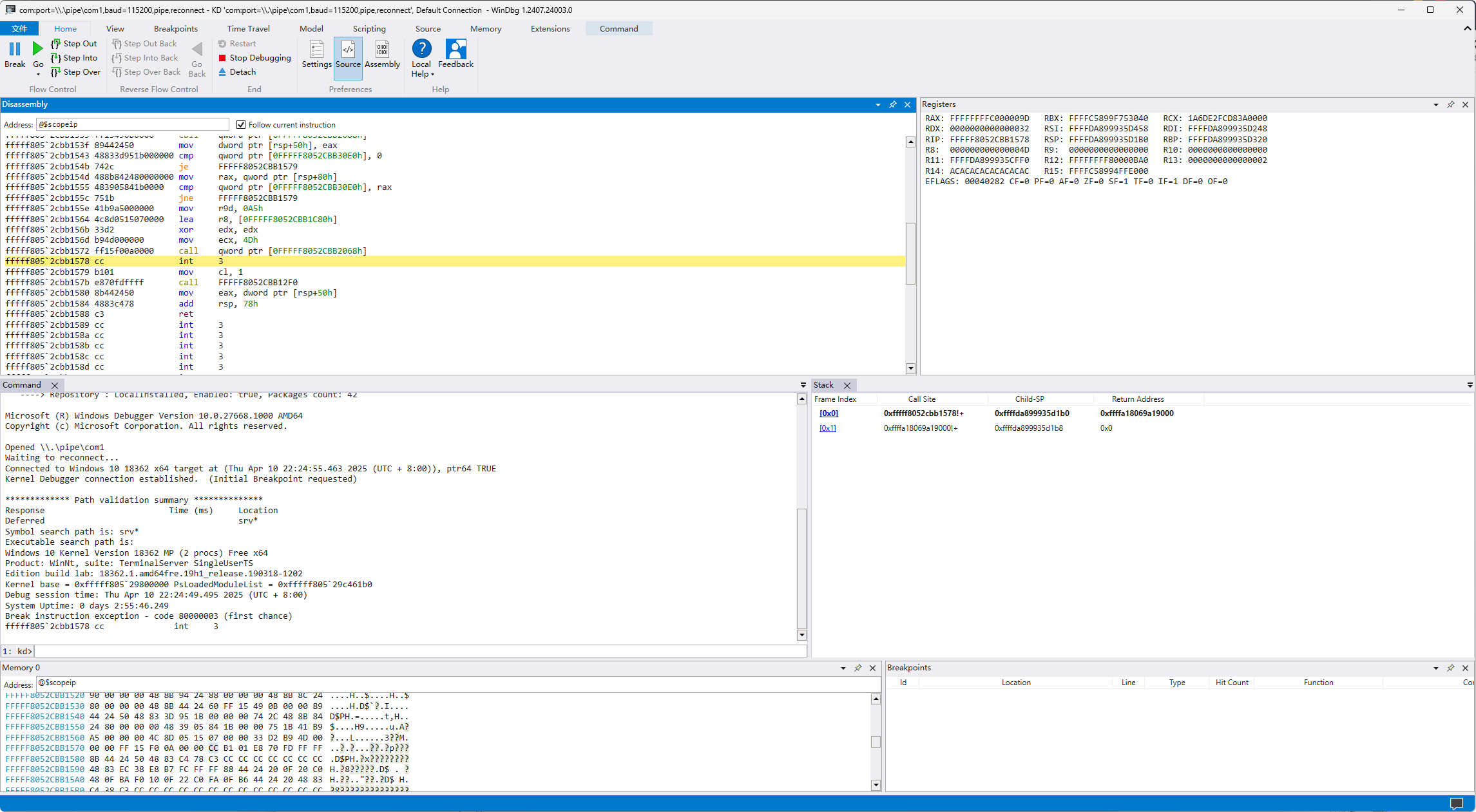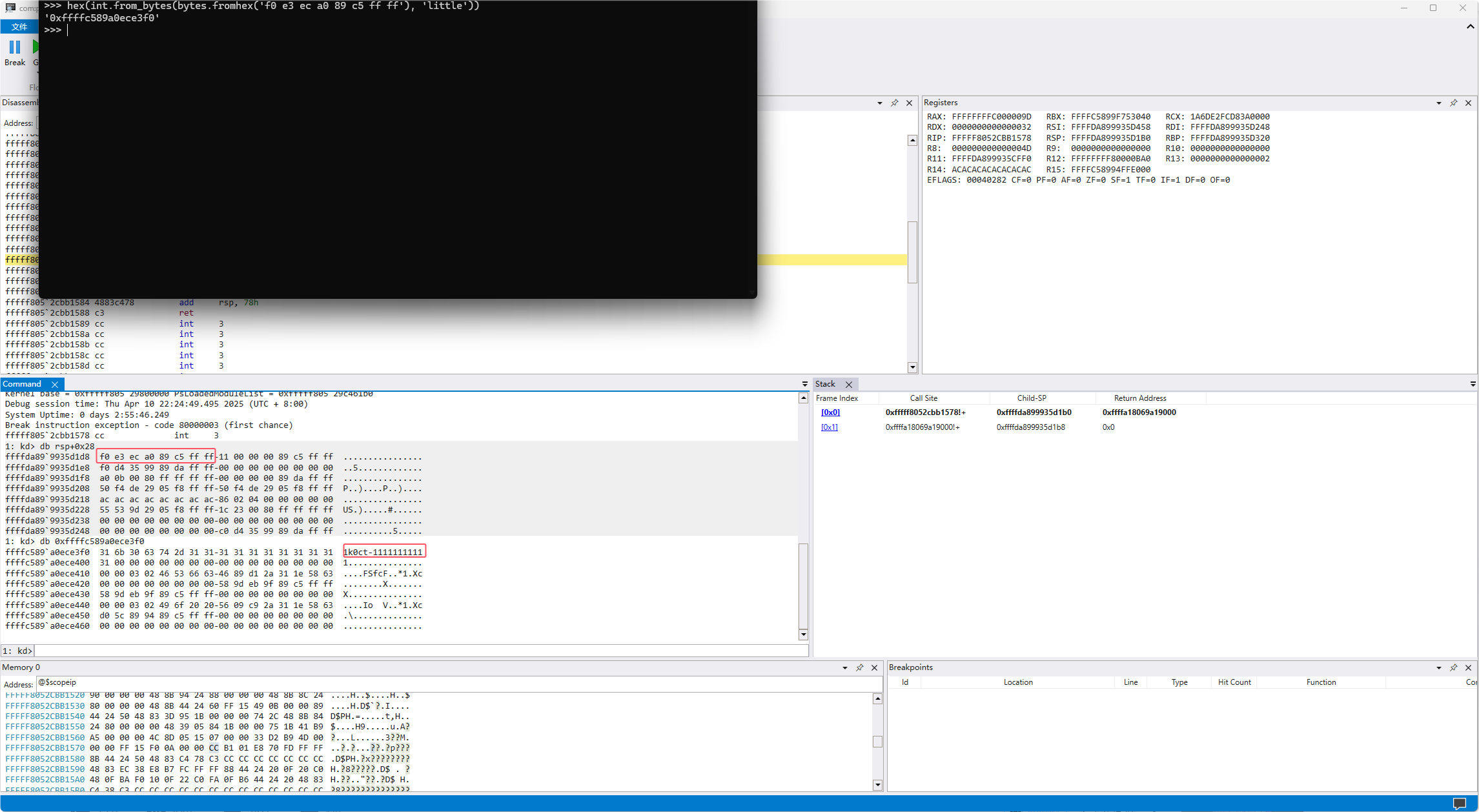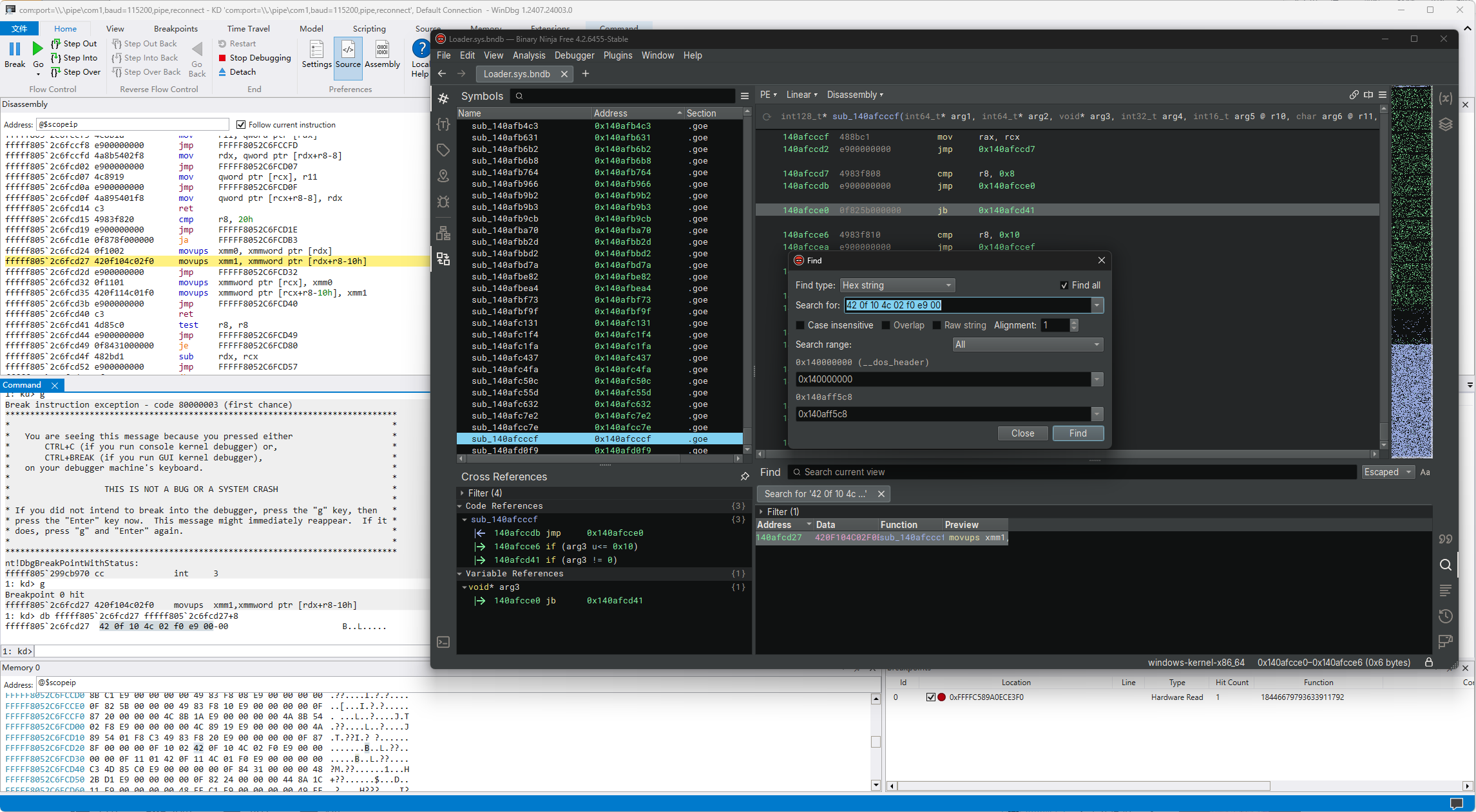1
2
3
4
5
6
7
8
9
10
11
12
13
14
15
16
17
18
19
20
21
22
23
24
25
26
27
28
29
30
31
32
33
34
35
36
37
38
39
40
41
42
43
44
45
46
47
48
49
50
51
52
53
54
55
56
57
58
59
60
61
62
63
64
65
66
67
68
69
70
71
72
73
74
75
76
77
78
79
80
81
82
83
84
85
86
87
88
89
90
91
92
93
94
95
96
97
98
99
100
101
102
103
104
105
106
107
108
109
110
111
112
113
114
115
116
117
118
119
120
121
122
123
124
125
126
127
128
129
130
131
132
133
134
135
136
137
138
139
140
141
142
143
144
145
146
147
148
149
150
151
152
153
154
155
156
157
158
159
160
161
162
163
164
165
166
167
168
169
170
171
172
173
174
175
176
177
178
179
180
181
182
183
184
185
186
187
188
189
190
191
192
193
194
195
196
197
198
199
200
201
202
203
204
205
206
207
208
209
210
211
212
213
214
215
216
217
218
219
220
| #include <string.h>
#include <ntifs.h>
#include <ntdef.h>
#include <ntstatus.h>
#include <ntddk.h>
#include <ntstrsafe.h>
#define MAX_BACKTRACE_DEPTH 0x20
#define SYM L"\\??\\Hook_API"
#define kprintf(format, ...) DbgPrintEx(DPFLTR_IHVDRIVER_ID, DPFLTR_ERROR_LEVEL, format, __VA_ARGS__)
typedef UINT64 u64;
typedef UINT32 u32;
typedef UINT16 u16;
typedef UINT8 u8;
u8 mov_jmp_rax1[12] = {
0x48,0xB8,0x00,0x00,0x00,0x00,0x00,0x00,0x00,0x00,
0xFF,0xE0
}, mov_jmp_rax2[12] = {
0x48,0xB8,0x00,0x00,0x00,0x00,0x00,0x00,0x00,0x00,
0xFF,0xE0
}, origin1[12] = {
0x00,0x00,0x00,0x00,0x00,0x00,0x00,0x00,0x00,0x00,
0x00,0x00
}, origin2[12] = {
0x00,0x00,0x00,0x00,0x00,0x00,0x00,0x00,0x00,0x00,
0x00,0x00
};
u8* HookAddr1 = NULL, * HookAddr2 = NULL, Hooked1 = FALSE, Hooked2 = FALSE;
KIRQL writeProtectOFFx64() {
KIRQL OldIrql;
OldIrql = KeRaiseIrqlToDpcLevel();
__writecr0(__readcr0() & ~0x10000);
_disable();
return OldIrql;
}
void writeProtectONx64(KIRQL OldIrql) {
_enable();
__writecr0(__readcr0() | 0x10000);
KeLowerIrql(OldIrql);
}
NTSTATUS dohook1(u8 HOOK) {
Hooked1 = HOOK;
KIRQL irql = writeProtectOFFx64();
if (HookAddr1) {
if (!HOOK) {
memcpy(HookAddr1, origin1, sizeof(origin1));
}
else {
memcpy(HookAddr1, mov_jmp_rax1, sizeof(mov_jmp_rax1));
}
}
writeProtectONx64(irql);
return STATUS_SUCCESS;
}
NTSTATUS dohook2(u8 HOOK) {
Hooked2 = HOOK;
KIRQL irql = writeProtectOFFx64();
if (HookAddr2) {
if (!HOOK) {
memcpy(HookAddr2, origin2, sizeof(origin2));
}
else {
memcpy(HookAddr2, mov_jmp_rax2, sizeof(mov_jmp_rax2));
}
}
writeProtectONx64(irql);
return STATUS_SUCCESS;
}
typedef NTSTATUS(*createfile_ptr)(
_Out_ PHANDLE FileHandle,
_In_ ACCESS_MASK DesiredAccess,
_In_ PCOBJECT_ATTRIBUTES ObjectAttributes,
_Out_ PIO_STATUS_BLOCK IoStatusBlock,
_In_opt_ PLARGE_INTEGER AllocationSize,
_In_ ULONG FileAttributes,
_In_ ULONG ShareAccess,
_In_ ULONG CreateDisposition,
_In_ ULONG CreateOptions,
_In_reads_bytes_opt_(EaLength) PVOID EaBuffer,
_In_ ULONG EaLength
);
typedef NTSTATUS(*readfile_ptr)(
_In_ HANDLE FileHandle,
_In_opt_ HANDLE Event,
_In_opt_ PIO_APC_ROUTINE ApcRoutine,
_In_opt_ PVOID ApcContext,
_Out_ PIO_STATUS_BLOCK IoStatusBlock,
_Out_writes_bytes_(Length) PVOID Buffer,
_In_ ULONG Length,
_In_opt_ PLARGE_INTEGER ByteOffset,
_In_opt_ PULONG Key
);
HANDLE FileHandler = NULL;
NTSTATUS mycreatefile(
_Out_ PHANDLE FileHandle,
_In_ ACCESS_MASK DesiredAccess,
_In_ PCOBJECT_ATTRIBUTES ObjectAttributes,
_Out_ PIO_STATUS_BLOCK IoStatusBlock,
_In_opt_ PLARGE_INTEGER AllocationSize,
_In_ ULONG FileAttributes,
_In_ ULONG ShareAccess,
_In_ ULONG CreateDisposition,
_In_ ULONG CreateOptions,
_In_reads_bytes_opt_(EaLength) PVOID EaBuffer,
_In_ ULONG EaLength
) {
dohook1(FALSE);
createfile_ptr createfile = (createfile_ptr)HookAddr1;
NTSTATUS status = createfile(
FileHandle,
DesiredAccess,
ObjectAttributes,
IoStatusBlock,
AllocationSize,
FileAttributes,
ShareAccess,
CreateDisposition,
CreateOptions,
EaBuffer,
EaLength
);
if (!wcscmp(ObjectAttributes->ObjectName->Buffer, L"\\??\\C:\\card.txt")) {
kprintf("Line %d: Reading card.txt detected in NtCreateFile\n", __LINE__);
FileHandler = *FileHandle;
}
dohook1(TRUE);
return status;
}
NTSTATUS myreadfile(
_In_ HANDLE FileHandle,
_In_opt_ HANDLE Event,
_In_opt_ PIO_APC_ROUTINE ApcRoutine,
_In_opt_ PVOID ApcContext,
_Out_ PIO_STATUS_BLOCK IoStatusBlock,
_Out_writes_bytes_(Length) PVOID Buffer,
_In_ ULONG Length,
_In_opt_ PLARGE_INTEGER ByteOffset,
_In_opt_ PULONG Key
) {
dohook2(FALSE);
readfile_ptr readfile = (readfile_ptr)HookAddr2;
NTSTATUS status = readfile(
FileHandle,
Event,
ApcRoutine,
ApcContext,
IoStatusBlock,
Buffer,
Length,
ByteOffset,
Key
);
if (FileHandler && FileHandler == FileHandle) {
kprintf("Line %d: Reading card.txt detected in NtReadFile\n", __LINE__);
u8 CorrectPair[] = "ACE-4051574845\x00";
memset(Buffer, 0, 0x1000);
memcpy(Buffer, CorrectPair, strlen(CorrectPair));
}
dohook2(TRUE);
return status;
}
void DeleteDevice(PDRIVER_OBJECT pDriver) {
kprintf("Line %d: Deleting Driver\n", __LINE__);
if (pDriver->DeviceObject) {
UNICODE_STRING DeviceName;
RtlInitUnicodeString(&DeviceName, SYM);
IoDeleteSymbolicLink(&DeviceName);
IoDeleteDevice(pDriver->DeviceObject);
}
kprintf("Line %d: Driver Deleted\n", __LINE__);
}
void DriverUnload(PDRIVER_OBJECT pDriver) {
kprintf("Line %d: Unloading Driver\n", __LINE__);
if (Hooked1) {
dohook1(FALSE);
}
if (Hooked2) {
dohook2(FALSE);
}
DeleteDevice(pDriver);
kprintf("Line %d: Driver Unloaded\n", __LINE__);
}
NTSTATUS DriverEntry(
_In_ PDRIVER_OBJECT DriverObject,
_In_ PUNICODE_STRING RegistryPath
) {
DriverObject->DriverUnload = DriverUnload;
kprintf("Line %d: Driver Loaded, RegistryPath : %S\n", __LINE__, RegistryPath->Buffer);
HookAddr1 = (u64)NtCreateFile;
HookAddr2 = (u64)NtReadFile;
kprintf("Line %d: HookAddr1 : 0x%llx, HookAddr2 : 0x%llx\n", __LINE__, HookAddr1, HookAddr2);
if (!HookAddr1 || !HookAddr2) {
kprintf("Line %d: HookAddr1 or HookAddr2 is NULL\n", __LINE__);
return STATUS_UNSUCCESSFUL;
}
memcpy(origin1, HookAddr1, sizeof(origin1));
memcpy(origin2, HookAddr2, sizeof(origin2));
*((u64*)(mov_jmp_rax1 + 2)) = (u64)mycreatefile;
*((u64*)(mov_jmp_rax2 + 2)) = (u64)myreadfile;
dohook1(TRUE);
dohook2(TRUE);
kprintf("Line %d: Hooked NtCreateFile and NtReadFile\n", __LINE__);
return STATUS_SUCCESS;
}
|





